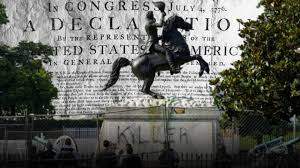You Say You Want a Revolution?

They can take down Teddy Roosevelt, and Princeton can cancel Woodrow Wilson. They can topple Ulysses Grant, deface the Lincoln Memorial, throw ropes around Andrew Jackson in Lafayette Square, knock down the author of “The Star-Spangled Banner,” put Thomas Jefferson in storage, and say America’s founding began in 1619. But they can’t make the Fourth of July disappear.
Rewriting history doesn’t yet include eliminating daily turns of the calendar, so they will have to endure the hard fact that between July 3 and July 5 falls the Fourth of July and that most Americans still believe this day is about the signing of the Declaration of Independence on July 4, 1776.
This is the most notable July 4 in a long time, because the United States, all of a sudden, is in a revolutionary moment.
Until now, the Fourth of July was the holiday celebrated by everyone in the U.S. as an American tradition. The message being sent by the protesters in the streets is, “Your traditions don’t mean a thing to us, and we will toss them out as we see fit.”
Each year, nearly every town holds a Fourth of July parade and celebrates with evening fireworks. This year, the coronavirus pandemic means few parades, while in New York City and elsewhere, massive nightly fireworks are intended to intimidate, not celebrate.
The Fourth of July is, or was, a day of families joined in quiet expressions of patriotism, with American flags flying. This year, families are divided, the air filled with shouted bitterness and somewhere this weekend an American flag will be burned.
The U.S. is in a revolutionary moment not just because of the street protests after the death of George Floyd or because of the pulling down of presidents’ monuments. On their own, these demonstrations wouldn’t come to much, primarily because—if the on-camera interviews conducted with protesters are representative—the substance of their protest is so unformed and diffused. Fireworks—loud, startling and self-extinguishing—are an apt metaphor.
The important element is the acts of consent from America’s elites. These people sit atop the country’s commanding institutions—in academia, business, politics, bureaucracies, media, book publishing, museums, philanthropies—and their instant assent provides legitimacy and puts us into something resembling a revolutionary situation. Which means this will be a revolutionary presidential election, the second in a row.
In that spirit, let me recommend some weekend reading: the Declaration of Independence. See how you react to revisiting the ideas that made a real revolution, stated in less than 1,500 words.
Even amid that upheaval there was wit. Without once naming George III, they refer merely to “the present King of Great Britain.” Today you would search in vain for a member of the “resistance” who consigns Mr. Trump to anonymity as “the current president of the United States.” That no such sophisticated insult is possible reflects how far we’ve come, or gone.
Among the most striking differences between revolutionaries then and now is that the signers included in their Declaration a bill of particulars for their intention to separate. Once past Jefferson’s famous phrases about all men created equal and unalienable rights, he states, “let facts be submitted” and lays them out in 27 staccato paragraphs.
One is struck by the tone of optimistic defiance in the Declaration’s text. Compare it with the pro forma, almost cookie-cutter language in statements from the boards of directors at Princeton or the American Museum of Natural History, who instead sound like defeated men and women. Wherever the current revolt may end, it’s hard to see our own confused, wan elites as the heirs to the country’s original leadership.
A forewarning to Trumpians: These first declarers also take “the Tyrant” to task on immigrants, for “refusing to pass” laws “to encourage their migrations hither.” And international commerce, “for cutting off our Trade with all parts of the world.” All sides today will claim to find supporting language in the Declaration’s text, such as, “They too have been deaf to the voice of justice.”
Times change—and that’s the point. Through the Revolution, the Civil War and all the years since that signing, the American idea has been about social, political and economic progress.
In contrast, the defining symbol that now attaches to the current revolution—and their conscious choice—is the removing of monuments, including the general who won the War for Independence and the general who won the Civil War over slavery.
It is a misstatement to call what is going on now an American revolution. The Declaration’s revolution was about creating a new nation. Today’s claimants see the future as de novo, a blank slate, an exercise in elimination. It is closer to what the ever-ironic 1960s radical anarchist Abbie Hoffman called “revolution for the hell of it.” That isn’t enough.
This weekend’s Fourth of July is the 244th anniversary of American’s first revolution. It remains the benchmark against which any successor idea must be measured.
Photo and Link: https://www.wsj.com/articles/you-say-you-want-a-revolution-11593642468?cx_testId=3&cx_testVariant=cx_2&cx_artPos=4




